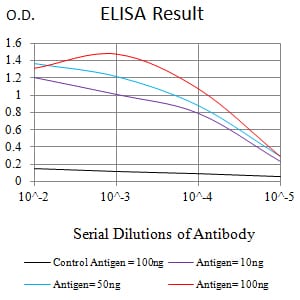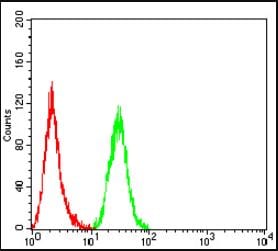

| WB | 咨询技术 | Human,Mouse,Rat |
| IF | 咨询技术 | Human,Mouse,Rat |
| IHC | 咨询技术 | Human,Mouse,Rat |
| ICC | 技术咨询 | Human,Mouse,Rat |
| FCM | 1/200 - 1/400 | Human,Mouse,Rat |
| Elisa | 1/10000 | Human,Mouse,Rat |
| Aliases | API3; ILP1; MIHA; XLP2; BIRC4; IAP-3; hIAP3; hIAP-3 |
| Entrez GeneID | 331 |
| clone | 4C12G10 |
| WB Predicted band size | 56.7kDa |
| Host/Isotype | Mouse IgG2b |
| Antibody Type | Primary antibody |
| Storage | Store at 4°C short term. Aliquot and store at -20°C long term. Avoid freeze/thaw cycles. |
| Species Reactivity | Human |
| Immunogen | Purified recombinant fragment of human XIAP (AA: 1-268) expressed in E. Coli. |
| Formulation | Purified antibody in PBS with 0.05% sodium azide |
+ +
以下是关于XIAP抗体的3篇参考文献,涵盖其功能研究及治疗应用:
---
1. **文献名称**:*X-linked inhibitor of apoptosis protein (XIAP) is a direct target of miR-200a and regulates apoptosis in human renal cell carcinoma*
**作者**:Takahashi R, et al.
**摘要**:该研究揭示了miR-200a通过靶向抑制XIAP表达,增强肾癌细胞对凋亡的敏感性,表明XIAP抗体可作为评估肿瘤凋亡抗性的工具。
2. **文献名称**:*Targeting XIAP for the treatment of malignancy*
**作者**:Schimmer AD, et al.
**摘要**:文章综述了XIAP在肿瘤耐药中的作用,并探讨了基于XIAP抗体或小分子抑制剂的治疗策略,包括临床前模型中抗体介导的凋亡促进效果。
3. **文献名称**:*A novel monoclonal antibody targeting XIAP induces tumor cell apoptosis and synergizes with chemotherapy*
**作者**:Carter BZ, et al.
**摘要**:研究团队开发了一种新型XIAP单克隆抗体,证明其能有效阻断XIAP与caspase-9的相互作用,并在联合化疗时显著提高白血病细胞的凋亡率。
---
这些文献涵盖了XIAP在凋亡调控、肿瘤治疗中的机制及抗体应用的实验证据,可为相关研究提供参考。
XIAP (X-linked inhibitor of apoptosis) antibodies are tools used to study the XIAP protein, a key regulator of programmed cell death (apoptosis). XIAP, encoded by the *BIRC4* gene, belongs to the inhibitor of apoptosis (IAP) family and functions by binding to caspases, enzymes that drive apoptosis, thereby blocking their activity. This anti-apoptotic role makes XIAP critical in cellular survival, immune response modulation, and cancer progression. Structurally, XIAP contains three BIR (baculovirus IAP repeat) domains that inhibit caspases and a RING domain enabling ubiquitin ligase activity for protein degradation.
XIAP antibodies are widely employed in research to detect XIAP expression levels via techniques like Western blotting, immunohistochemistry, and flow cytometry. Dysregulation of XIAP is linked to diseases: overexpression is associated with cancer chemoresistance, while mutations cause X-linked lymphoproliferative syndrome type 2 (XLP-2), a rare immunodeficiency. Researchers also use XIAP antibodies to explore therapeutic strategies, such as small-molecule inhibitors or gene silencing, to counteract XIAP’s pro-survival effects in malignancies. Additionally, these antibodies help elucidate XIAP’s non-apoptotic roles, including NF-κB signaling and inflammatory pathways. As XIAP remains a promising therapeutic target, its antibodies are vital for both mechanistic studies and translational applications in oncology and immunology.
×